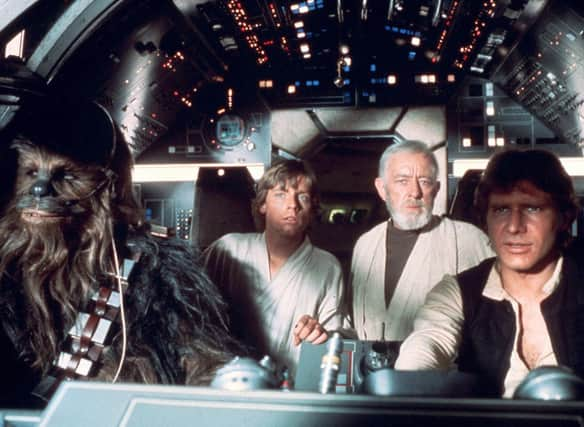May the 4th be with you: What is Star Wars Day and how long ago did the celebration start?


The first Star Wars movie “A New Hope” was written and directed by George Lucas and released to a limited number of cinemas in the United States in 1977. Unbeknownst to him or his friends at Lucasfilm and 20th Century-Fox, it would become the highest-grossing film of its time.
It rapidly became a blockbuster hit and global phenomenon leading to its evolution into a much wider franchise which would boast comic books, video games, TV shows and theme parks.
Advertisement
Hide AdAdvertisement
Hide AdThat said, as the famous ‘May the Fourth’ or Star Wars Day falls this week, let’s explore the history of the date and why so many fans still show their appreciation of George Lucas’ iconic work.
A Brief History of the Star Wars franchise
A long time ago, in a decade far far away, the movie Star Wars: A New Hope (Episode IV) was released in 1977 and won over the hearts of millions. It brought in an impressive $775 million in the global box office which saw the franchise expand into an industry of its own.
Nowadays, cinema goers are spoiled by special effects but the Star Wars films were incredibly innovative for their time and pioneered much of the on-screen flare we so enjoy. The success of ‘A New Hope’ ignited new hope for the films leading to the creation of two sequels; ‘The Empire Strikes Back’ (1980) and ‘Return of the Jedi’ (1983) which were also well-loved by audiences.
George Lucas later decided to direct a prequel trilogy, which proudly featured Scottish actor Ewan McGregor as Obi Wan Kenobi, in ‘The Phantom Menace’ (1999), ‘Attack of the Clones’ (2002) and ‘Revenge of the Sith’ (2005).


LucasFilms was then bought by Disney in 2012 for $4.05 billion, the company released a sequel trilogy with ‘The Force Awakens’ (2015), ‘The Last Jedi’ (2017) and ‘The Rise of Skywalker’ (2019). Many fans called Disney’s takeover a ‘final nail in the coffin’ for the franchise while others remain enthusiastic and open minded about it.
Why is Star Wars Day on May 4th?
Any Star Wars fan could tell you that May the 4th is Star Wars day because it’s a reference to the iconic phrase “May the force be with you” which is repeatedly said by Jedi Masters in the films.
The saying was famously used in the United Kingdom on May 4, 1979, when Margaret Thatcher took office as prime minister. The London Evening News covered the story with the headline “May the Fourth Be With You, Maggie. Congratulations!”
Advertisement
Hide AdAdvertisement
Hide AdHowever, the first mention of the catchphrase dates back to 1978 when newspapers in the United States used the phrase in recognition of Independence Day on July 4.
When was Star Wars Day first celebrated?
Despite “May the Fourth” being mentioned much earlier, the first celebration of Star Wars Day took place at the Toronto Underground Cinema in 2001. It featured a movie marathon, costume contest and many other Star Wars themed festivities.
Now, decades later, fans are preparing to celebrate again as Star Wars Day falls on Thursday, May 4, 2023. So, in the words of Chewbacca: “Urrrrrrrrrr Ahrrrrrrrrr Urrrrrr Ahrrrrrrrr” which means “Have a great Star Wars Day, everybody!”
Comments
Want to join the conversation? Please or to comment on this article.
